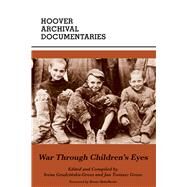War Through Children's Eyes The Soviet Occupation of Poland and the Deportations, 1939–1941
, by Gross, Jan T.; Grudzin'ska-Gross, Irena; Gross, Jan Tomasz; Grudzinska-Gross, Irena- ISBN: 9780817974725 | 0817974725
- Cover: Paperback
- Copyright: 9/15/2019
On September 17, 1939, two weeks after the German invasion of Poland, Soviet troops occupied the eastern half of Poland and swiftly imposed a new political and economic order. Following a plebiscite, in early November the area was annexed to the Ukraine and Belorussia. Beginning in the winter of 1939–40, Soviet authorities deported over one million Poles, many of them children, to various provinces of the Soviet Union. After the German attack on the USSR in summer 1941, the Polish government in exile in London received permission from its new-found ally to organize military units among the Polish deportees and later to transfer Polish civilians to camps in the British-controlled Middle East. There the children were able to attend Polish-run schools.
The 120 essays translated here were selected from compositions written by the students of these schools. What makes these documents unique is the perception of these witnesses: a child’s eye view of events no adult would consider worth mentioning. In simple language, filled with misspellings and grammatical errors, the children recorded their experiences, and sometimes their surprisingly mature understanding, of the invasion and the Societ occupation, the deportations eastward, and life in the work camps and kolkhozes. The horrors of life in the USSR were vivid memories; privation, hunger, disease, and death had been so frequent that they became accepted commonplaces. Moreover, as the editors point out in their introductory study, these Polish children were not alone in their suffering. All the nationalities that came under Soviet rule shared their fate.







